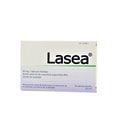Lasea 80 Mg 28 Soft Capsules
Lasea 80 mg 28 soft capsules is a natural lavender-based medication for transient anxiety relief in adults. It offers an effective, well-tolerated solution without excessive drowsiness. Safe and easy to use, it’s available without a prescription at parafarmacia-online.com, your trusted source for quality products.
Lasea 80 mg 28 soft capsules is a natural lavender-based medication for transient anxiety relief in adults. It offers an effective, well-tolerated solution without excessive drowsiness. Safe and easy to use, it’s available without a prescription at parafarmacia-online.com, your trusted source for quality products.
Buy Lasea 80mg 28Soft Capsules: Natural Anxiety Relief
Lasea: What is it and what is it used for?
Lasea is a natural medication designed to treat transient anxiety symptoms in adults. Many people ask, "What is Lasea used for?" The answer is simple: it’s an effective and safe treatment that helps reduce anxiety thanks to its lavender-based formula.
How does Lasea work?
Lasea works through the active substances in lavender, which cross the blood-brain barrier and interact with serotonin receptors in the brain. This action helps regulate anxiety effectively, making these pills for anxiety an excellent natural alternative.
Who is Lasea for?
Lasea is intended for adults experiencing transient anxiety. While not recommended for children, teenagers, or individuals with liver impairment, it’s a reliable option for managing symptoms safely.
Lasea Dosage
- Daily dose: One capsule per day, preferably at the same time.
- Treatment duration: Maximum of 3 months. If symptoms persist or worsen after one month, consult a doctor.
- How to take it: Swallow the capsule with plenty of water, do not chew, and avoid taking it while lying down.
These instructions ensure proper use of Lasea, optimizing its effectiveness as pills for anxiety.
How to use Lasea correctly
To make the most of Lasea, follow these recommendations:
- It can be taken with or without food.
- Swallow the capsule whole with water; do not chew.
- Avoid taking the capsules right before bedtime.
Contraindications of Lasea
Do not use Lasea if:
- You are allergic to lavender or any of its components.
- You suffer from liver impairment.
Precautions for using Lasea
Before taking Lasea, consider the following:
- It is not recommended for patients undergoing dialysis due to a lack of clinical data.
- Contains sorbitol; people with hereditary fructose intolerance should avoid it.
Advice for patients using Lasea
- Consult a doctor if anxiety symptoms do not improve after one month of treatment.
- Avoid combining Lasea with other anxiolytics, sedatives, or alcohol without professional advice.
Lasea during pregnancy and breastfeeding
- Pregnancy: Not recommended due to insufficient clinical studies in humans.
- Breastfeeding: There is no information on whether the active ingredients pass into breast milk, so use is not advised.
Lasea reviews
Users of Lasea praise its effectiveness as a natural pill for anxiety. Reviews highlight its ability to help manage anxiety without causing excessive drowsiness, making it a well-tolerated option for most people.
Lasea price and where to buy
Looking for Lasea price or where to buy it? You can purchase Lasea 80 mg 28 soft capsules on our website, parafarmacia-online.com (title: parafarmacia-online.com). We offer a secure and reliable shopping experience with guaranteed product quality.
Lasea leaflet
For more detailed information, consult the full leaflet of Lasea, where you will find everything you need to know about its benefits, possible side effects, and warnings.




